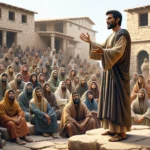
“Zayin” (ז) is the seventh letter of the Hebrew alphabet and serves as the heading for the seventh section of Psalm 119 (verses 49-56). In this section, each verse starts with “Zayin” in the original Hebrew text, continuing the acrostic pattern that characterizes the entire psalm.
Literal Meaning and Symbolism: “Zayin” literally means “weapon” or “sword” in Hebrew. In the context of Psalm 119, this could symbolize the Word of God as a spiritual weapon for the believer. Just as a sword is used for defense and to assert authority, God’s Word provides protection against spiritual adversaries and guidance through life’s challenges.
Spiritual Warfare and Protection: The association of “Zayin” with a weapon underscores the theme of spiritual warfare and the protective power of adhering to God’s laws. It suggests that the psalmist views adherence to God’s commandments as a form of spiritual armor against the forces of evil and temptation.
The Word of God as a Tool for Righteousness: In line with “Zayin” representing a sword or weapon, this section of Psalm 119 emphasizes the importance of God’s Word in promoting righteousness and justice. It serves as a tool in the believer’s efforts to live a godly life, akin to how a sword is used with skill and precision.
Cutting Away Unrighteousness: The imagery of a sword can also symbolize the discerning and dividing power of God’s Word, able to separate truth from falsehood and to convict the heart of sin, prompting repentance and spiritual growth.
Defensive and Offensive Use: Just as a physical sword can be used both defensively and offensively, “Zayin” can represent the dual function of God’s Word in the believer’s life: defending against spiritual deception and sin, and actively advancing the cause of God’s kingdom through proclamation and righteous living.
In summary, “Zayin” in Psalm 119 symbolizes the Word of God as a spiritual weapon that provides protection, promotes righteousness, and equips the believer for spiritual warfare. It highlights the active and dynamic role of scripture in the life of the believer, not only as a source of comfort and guidance but also as a means of defense and advancement in the spiritual realm.
Psalm 119:49-56: Verse by Verse Analysis
Verse 49:
- Text: “Remember your word to your servant, for you have given me hope.”
- Reflection: The psalmist appeals to God to fulfill His promises, which have been a source of hope.
- Cross-reference: Hebrews 10:23 – “Let us hold unswervingly to the hope we profess, for he who promised is faithful.”
Verse 50:
- Text: “My comfort in my suffering is this: Your promise preserves my life.”
- Reflection: In times of suffering, the psalmist finds comfort in God’s promises, seeing them as life-preserving.
- Cross-reference: Romans 15:4 – “For everything that was written in the past was written to teach us, so that through the endurance taught in the Scriptures and the encouragement they provide we might have hope.”
Verse 51:
- Text: “The arrogant mock me unmercifully, but I do not turn from your law.”
- Reflection: Despite being mocked by the arrogant, the psalmist remains steadfast in following God’s law.
- Cross-reference: Job 17:3 – “Give me, O God, the pledge you demand. Who else will put up security for me?”
Verse 52:
- Text: “I remember your ancient laws, O Lord, and I find comfort in them.”
- Reflection: Reflecting on God’s eternal laws brings the psalmist comfort amid adversity.
- Cross-reference: Deuteronomy 33:27 – “The eternal God is your refuge, and underneath are the everlasting arms.”
Verse 53:
- Text: “Indignation grips me because of the wicked, who have forsaken your law.”
- Reflection: The psalmist expresses deep distress over those who disregard God’s laws.
- Cross-reference: Psalm 119:158 – “I look on the faithless with loathing, for they do not obey your word.”
Verse 54:
- Text: “Your decrees are the theme of my song wherever I lodge.”
- Reflection: God’s statutes are so central to the psalmist’s life that they become his song in every place he stays.
- Cross-reference: Ephesians 5:19 – “speaking to one another with psalms, hymns, and songs from the Spirit. Sing and make music from your heart to the Lord,”
Verse 55:
- Text: “In the night, Lord, I remember your name, that I may keep your law.”
- Reflection: Even at night, the psalmist meditates on God’s name as a means to adhere to His law.
- Cross-reference: Psalm 63:6 – “On my bed I remember you; I think of you through the watches of the night.”
Verse 56:
- Text: “This has been my practice: I obey your precepts.”
- Reflection: The psalmist summarizes his commitment to living according to God’s precepts.
- Cross-reference: Psalm 119:22 – “Remove from me their scorn and contempt, for I keep your statutes.”
Key Takeaways from Psalm 119:49-56:
Hope and Comfort in God’s Promises: The psalmist highlights the sustaining power of God’s promises, which offer hope and comfort in times of suffering. This underscores the importance of clinging to divine assurances amidst life’s challenges.
Steadfastness Amidst Adversity: Despite mockery and the actions of the wicked, the psalmist’s commitment to God’s law remains unwavering, showcasing the strength of faith and conviction.
Meditation on God’s Law: The continuous meditation on God’s laws and decrees, even during the night, reflects a deep, personal engagement with God’s word, which guides and comforts the believer in every circumstance.
The Centrality of God’s Word: God’s statutes and precepts are not just rules to follow but are central to the psalmist’s identity and way of life, influencing his actions and becoming a source of joy and song.
The Importance of Remembrance: Remembering God’s name and His ancient laws is a practice that reinforces the psalmist’s dedication to keeping God’s law, highlighting the role of memory in spiritual perseverance and obedience.



